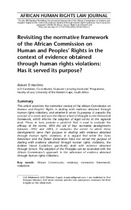Revisiting the normative framework of the African Commission on Human and Peoples’ Rights in the context of evidence obtained through human rights violations: Has it served its purpose?
Abstract
This article examines the normative context of the African Commission on
Human and Peoples’ Rights in dealing with evidence obtained through
human rights violations, and whether it serves its purpose. It unpacks the
concept of a norm and uses the liberal school of thought as the theoretical
framework, which informs the adoption of legal norms at the regional
level. These, in turn, provide a yardstick that is used to evaluate the
efficacy of the norms. With the aid of four normative developments
between 1992 and 2003, it evaluates the extent to which these
developments serve their purpose in dealing with evidence obtained
through human rights violations. It is argued that while the Tunis
Resolution and the Dakar Declaration have not served the purpose of
dealing with evidence obtained through human rights violations, the
Robben Island Guidelines specifically dealt with evidence obtained
through torture. The adoption of the Principles can be reconciled with the
African Commission’s approach to the admission of evidence obtained
through human rights violations.

